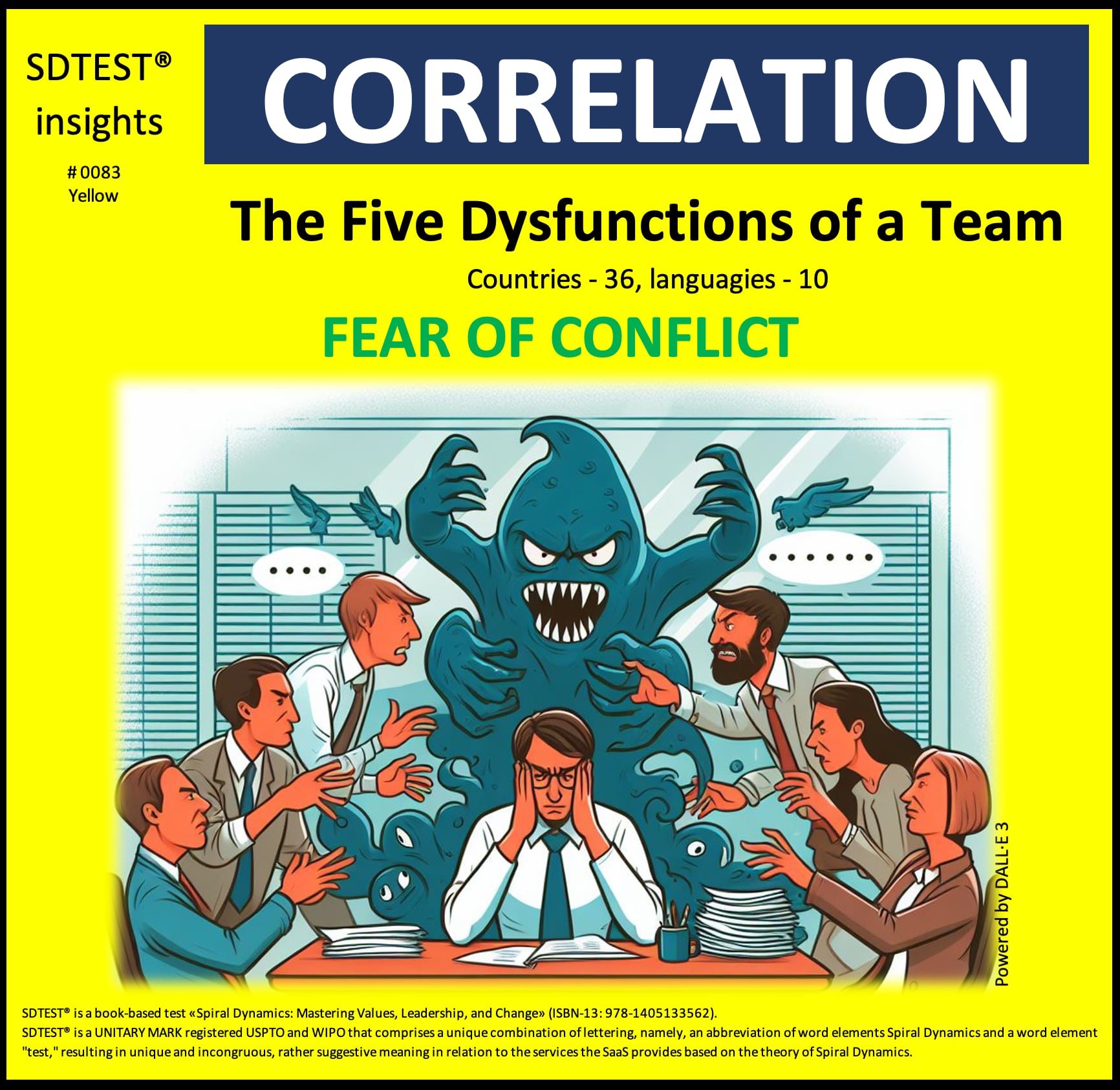Mastering Values, Leadership, and
Change» (ISBN-13: 978-1405133562)

SDTEST® has 28 different VUCA polls that calculate the 9,191 correlation values between stages of development according to the theory of Spiral Dynamics and answer options of these 28 polls.
We invite curiosity about the systemic mechanisms behind this correlation. There may be hidden variables that provide alternative explanations.
-0.1933 between the People can work independently and the Purple stage.
The critical value of the correlation coefficient for a normal distribution, by William Sealy Gosset (Student) r = 0.1642. This negative correlation of -0.1933 meets the reliability criteria but does not necessarily imply causation.

In this negative correlation of -0.1933, the negative association could be explained by the Purple stage's emphasis on collectivism, group cohesion, and adherence to established norms and practices.
Individuals at the Purple stage may value working collaboratively within their community or tribe, following the guidance of elders or leaders, and adhering to traditional ways of doing things. Working independently may contradict this value system's strong sense of community and interdependence.
Additionally, the Purple vMeme's reliance on rituals, taboos, and established practices could contribute to a preference for more structured and prescribed working methods rather than valuing individual autonomy or independent decision-making.
The Purple value system is characterized by a strong focus on tradition and spirituality and a deep sense of community and belonging to a group. Individuals operating from this worldview are guided by myths, rituals, and the beliefs and laws of their ancestors. They have a strong sense of identity rooted in their collective and believe in influential, all-knowing leaders or deities.
0.1447 between the NO, based on their seniority or personal relationships, and the Red stage.
The critical value of the correlation coefficient for a normal distribution, by William Sealy Gosset (Student) r = 0.1112. This positive correlation of 0.1447 meets the reliability criteria but does not necessarily imply causation.

This positive correlation of 0.1447 exceeds the critical value of 0.1112 and meets the reliability criteria for further examination.
The Red value system is characterized by a strong focus on power, self-expression, individualism, and a desire for immediate gratification. Individuals operating primarily from this worldview tend to be driven by their impulses, desires, and a sense of dominance. They are often competitive, assertive, and willing to use force or coercive means to achieve their goals, with little concern for rules or laws.
In this correlation, the perception that rewards and evaluations are based on seniority or personal relationships rather than meritocratic principles could resonate with the Red vMeme's emphasis on self-interest, power dynamics, and a disregard for established rules or systems.
Individuals at the Red stage may be more inclined to perceive such practices as a reflection of the dominance of those in positions of power or influence, aligning with their worldview of social interactions being driven by assertions of strength, status, and personal gain.
Furthermore, the Red value system's focus on immediate gratification and self-centered tendencies could contribute to a perception that personal relationships or seniority trump objective evaluations of performance and contribution, as these factors are more directly beneficial to one's own interests.
-0.0651 between the Sent employees on unpaid vacations and Blue stage.
The critical value of the correlation coefficient for a normal distribution, by William Sealy Gosset (Student) r = 0.0586. This negative correlation of -0.0651 meets the reliability criteria but does not necessarily imply causation.

This negative correlation of -0.0651 exceeds the critical value of 0.0586 and meets the reliability criteria for further analysis. The negative association could be explained by the Blue stage's focus on stability, structure, and a sense of duty toward one's organization or role.
The Blue value system strongly emphasizes order, rules, duty, discipline, and adherence to a moral code handed down from a higher authority. Individuals operating from this worldview tend to be loyal, rule-abiding, and have a strong sense of responsibility towards their group or organization.
Individuals at the Blue stage may perceive unpaid leaves as a disruption to the established order and a potential violation of the implicit social contract between employer and employee. Their strong sense of duty and loyalty could make them less inclined to support or endorse such actions by companies, as they may view it as a breach of trust or a departure from traditional employment norms.
Additionally, the Blue value system's emphasis on following rules, hierarchies, and established codes of conduct could contribute to a perception that unpaid leaves are inappropriate or unfair, particularly if clear policies or guidelines do not govern them.
-0.1154 between the Really listening to what others have to say / Strongly Agree and the Orange stage.
The critical value of the correlation coefficient for a normal distribution, by William Sealy Gosset (Student) r = 0.0857. This negative correlation of -0.1154 meets the reliability criteria but does not necessarily imply causation.

This negative correlation of -0.1154 exceeds the critical value of 0.0586, meets the reliability criteria for further analysis, and could be explained by the Orange stage's focus on objective, analytical thinking and a potential tendency to prioritize task-oriented or outcome-driven approaches over interpersonal considerations.
The Orange value system's emphasis on individualism, self-reliance, and competitiveness could contribute to a mindset that places less importance on really listening to others, as it may be perceived as a less direct path to achieving personal goals or objectives.
Individuals at the Orange stage may be more inclined to view empathy through a more rationalistic lens, emphasizing understanding and addressing situations or problems through logical analysis rather than prioritizing the subjective experiences or emotional states of others.
0.0874 between the Return to repression and the Green stage.
The critical value of the correlation coefficient for a normal distribution, by William Sealy Gosset (Student) r = 0.0357. This positive correlation of 0.0874 meets the reliability criteria but does not necessarily imply causation.

This positive correlation of 0.0874 exceeds the critical value of 0.0357, meets the reliability criteria for further analysis, and could be explained by the Green vMeme's emphasis on inclusivity, human rights, and a rejection of oppressive or authoritarian structures that limit individual freedoms or marginalize certain groups.
Individuals operating from the Green value system may be particularly attuned to the potential risks of societal regression towards repressive policies or ideologies that could undermine hard-won progress in civil liberties, social justice, and environmental protection.
The Green vMeme's focus on ecological sustainability and harmony with the natural world could also contribute to a fear of a return to exploitative or unsustainable practices that could jeopardize the long-term well-being of both people and the planet.
Additionally, the Green stage's emphasis on inclusivity, diversity, and respect for different perspectives may heighten concerns about the potential for oppressive ideologies or systems that could marginalize or suppress certain groups or viewpoints.
0.1874 between the Fear of Conflict (Healthy debates are pivotal for any team. Avoiding conflict leads to passive aggression and unresolved issues) and the Yellow stage.
The critical value of the correlation coefficient for a normal distribution, by William Sealy Gosset (Student) r = 0.1416. This positive correlation of 0.1874 meets the reliability criteria but does not necessarily imply causation.

This positive correlation of 0.1874 exceeds the critical value of 0.1416 and meets the reliability criteria for further examination. The Yellow value system represents the ability to integrate and transcend the previous value systems, characterized by a holistic, systems-thinking approach, an understanding of complex systems, and a focus on personal growth and development.
Individuals operating from this stage can see multiple perspectives associated with an integrative approach to understanding the world. In the context of this correlation, recognizing "Fear of Conflict" as a dysfunction in teams could resonate with the Yellow vMeme's emphasis on acknowledging complexity, embracing diverse perspectives, and fostering personal and collective growth.
Individuals at the Yellow stage may be more inclined to perceive the avoidance of healthy debates and the suppression of differing viewpoints as detrimental to the effective functioning of teams. Their ability to see multiple perspectives could contribute to an understanding that constructive conflict and the open exchange of ideas are necessary for teams to navigate complex challenges and reach optimal solutions.
Furthermore, the Yellow value system's focus on personal growth and development could align with the recognition that fear of conflict can hinder the growth and maturation of teams, as it may prevent them from addressing underlying issues, fostering trust, and achieving their full potential.
-0.1010 between the Career opportunities and the Turquoise stage.
The critical value of the correlation coefficient for a normal distribution, by William Sealy Gosset (Student) r = 0.0644. This negative correlation of -0.1010 meets the reliability criteria but does not necessarily imply causation.

This negative correlation of -0.1010 exceeds the critical value of 0.0644 and meets the reliability criteria for further examination, and could be explained by the Turquoise stage's tendency to transcend traditional career-centric paradigms and embrace a more holistic and purpose-driven approach to work and life.
Individuals at the Turquoise stage may be less inclined to prioritize traditional notions of career advancement or personal ambition, as their worldview is centered on the collective well-being of all and a recognition of the interdependence between human and natural systems.
Furthermore, the Turquoise value system's emphasis on sustainability, ecological harmony, and a deep connection to the natural world could lead individuals to prioritize roles or opportunities that align with these values rather than solely focusing on personal career advancement.
What insights do you gain from today's correlation? How might we study this relationship more carefully before deducing causation?
We welcome respectful and wise perspectives! Stay tuned every week as we share more results and insights.
After login or registration, free access to the poll results in the FAQ section.
